Book contents
- Frontmatter
- Contents
- List of Illustrations
- Notes on Contributors
- Preface
- I IDEOLOGIES
- II INTERPRETATIONS
- Crossing the Rubicon: History, Authority and Civil War in Twelfth-Century England
- ‘The Reader myghte lamente’: The sieges of Calais (1346) and Rouen (1418) in chronicle, poem and play
- Shakespeare's Casus Belly; or, Cormorant War, and the Wasting of Men on Shakespeare's Stage; or, Eating Wars and Digesting Plays; or, The Art of Chucking Men Into Pits; or, Shakespeare, Tacitism, and Why Plato Don't Matter
- Unnavigable Kinship in a Time of Conflict: Loyalist Calligraphies, Sovereign Power and the ‘Muckle Honor’ of Elizabeth Murray Inman
- Proclaiming the War News: Richard Caton Woodville and Herman Melville
- III AFTERMATHS
- Index
Crossing the Rubicon: History, Authority and Civil War in Twelfth-Century England
from II - INTERPRETATIONS
Published online by Cambridge University Press: 05 October 2014
- Frontmatter
- Contents
- List of Illustrations
- Notes on Contributors
- Preface
- I IDEOLOGIES
- II INTERPRETATIONS
- Crossing the Rubicon: History, Authority and Civil War in Twelfth-Century England
- ‘The Reader myghte lamente’: The sieges of Calais (1346) and Rouen (1418) in chronicle, poem and play
- Shakespeare's Casus Belly; or, Cormorant War, and the Wasting of Men on Shakespeare's Stage; or, Eating Wars and Digesting Plays; or, The Art of Chucking Men Into Pits; or, Shakespeare, Tacitism, and Why Plato Don't Matter
- Unnavigable Kinship in a Time of Conflict: Loyalist Calligraphies, Sovereign Power and the ‘Muckle Honor’ of Elizabeth Murray Inman
- Proclaiming the War News: Richard Caton Woodville and Herman Melville
- III AFTERMATHS
- Index
Summary
Civil conflict demolishes notions of identity and community in particularly violent and destructive ways. The project of writing civil war challenges the traditions and conventions of historiography and exceeds normal representational modes and idioms. England's twelfth-century civil war, during the reign of King Stephen (1135–54), is presented by contemporary texts as a calamity beyond the reach of conventional chronicle writing or received rhetoric. The Peterborough recension of the Anglo-Saxon Chronicle exclaims that:
I ne can ne I ne mai tellen alle þe wunder ne alle þe pines ðat hi diden wrecce men on þis land; ȷ ðat lastede þa xix wintre wile Stephne was king, ȷ æure it was uuerse ȷ uuerse.
I am neither able, nor wish to, tell all the horrors nor all the tortures that they did to the wretched men in this land; and that lasted nineteen winters while Stephen was king, and it always became worse and worse.
While the term ‘the Anarchy’, traditionally used to describe this period of civil conflict, is now challenged by some historians, there is no doubt that the contemporary medieval texts see the reign of Stephen as a time of extreme collapse, chaos and violence that goes beyond the norms of medieval warfare and martial engagement.
- Type
- Chapter
- Information
- War and Literature , pp. 61 - 83Publisher: Boydell & BrewerPrint publication year: 2014



